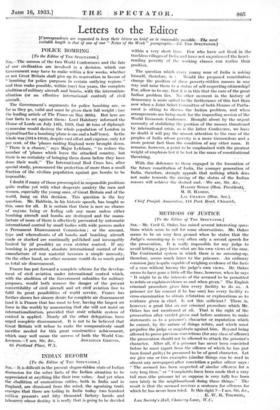METHODS OF JUSTICE [To the Editor of THE SPECTATOR.] SIR,—Mr.
Cecil G. Oakes has raised several interesting ques- tions which seem to call for some observations. Mr. Oakes seems to be on very firm ground when he states that the Judge's summing-up is very often only a second speech for the prosecution. It is really impossible for any judge to avoid letting a jUry know what are his own views of the case. The Continental system in which there is no summing-up, therefore, seems much fairer to the prisoner. An ordinary common jury is quite capable of weighing evidence of the facts of a case without having the judge's own views. Mr. Oakes seems to have gone a little off the lines, however, when he says " It might be in the interests of the accused to be permitted to refute or explain evidence as and when given." The English criminal procedure gives him every . facility to do so.. A prisoner (or his counsel if he has one) has every facility hi cross-examination to obtain refutation or explanations as to evidence given in chief.. Is not this sufficient? There ..is, however, a great blot on our criminal procedure which Mr. Oakes has not mentioned at all. That is the, right of the prosecution after verdict given and before, sentence to make statements as to a prisoner's character or, reputation which he cannot, by the nature of things refute, and which must prejudice the judge or magistrate against him: Beyond being allowed to prove previous convictions (for any class of offence) the prosecution should not be allowed to attack the prisoner's character. After all, if a prisoner has never been convicted before he must (apart from the offence of which he has just been found guilty) be presumed to be of good character. Let me give one or two examples (similar things can be read hi almost any newspaper). after conviction a police officer says : " The accused has been suspected of _similar offences for a very long time," or " Complaints have been made that a very tall man (the prisoner let us suppose is very tali) has been seen lately in the neighbourhood doing these things." The result is that the accused receives a sentence for offences for which lie has never been tried. Is this right Y-4 am, Sir, &e., B. :W+ R. THOMSON,
Law Society's Hall, Chancery Lane, MC'.










































 Previous page
Previous page